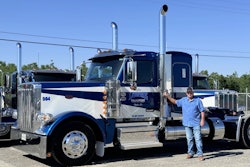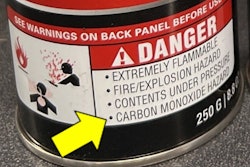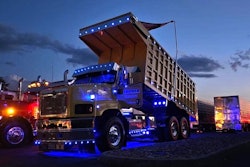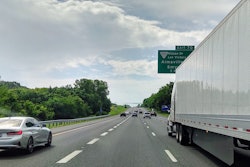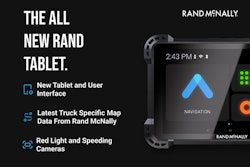Department of Transportation Secretary Pete Buttigieg officially kicked off the DOT's public-comment session around outsize and/or deceptive heavy-duty tow billing and practice, oft-described using the predatory descriptor for the most egregious examples, with an invocation of the essential nature of all parties to the discussion. That included both truck owners and operators responsible for hauling in all the tools and comforts of modern life as well as the tow truck drivers and owners on-call 24/7 with a responsibility to clear the path for delivery in sometimes gruesome on-highway circumstances after a wreck.
Yet Buttigieg made it clear that, in the DOT's view, exorbitant and/or hidden fees charged by towing companies should be part of the Federal Trade Commission's effort to ban junk fees of all stripes, as previously reported. His DOT, he said, "has been clear in our support for protections against predatory towing junk fees." He called for banning the practice of hiding fees, charging for unnecessary services, and the like. "We have a responsibility to act," he added.
When it comes to essential parties in the discussion held Friday, June 21, though, tow company owners and representatives led the way with forceful pushback against perceived overly simplistic views of what is or isn't predatory, with plenty attempts at explanation for why they charge what they charge, and objections to inclusion of towing-related fees in the FTC's regulation of so-called "junk fees."
Bill Johnson, president of the Towing and Recovery Association of America (TRAA), took aim at the American Transportation Research Institute's examination of invoices as flawed in significant ways, including what he called a sample of invoices too small and incomplete in nature to present a full picture of invoicing practice. The sample, too, was biased by "over-reliance on aggrieved operators," and lack of real distinction between consensual and nonconsensual tows in many cases, he noted. TRAA, he said, "believes FMCSA should conduct research about improper billing" much more robust that what's available in the ATRI report. "DOT’s position ignores facts around the complexity" in particular of emergency response during crash events.
Department of Transportation Secretary Pete Buttigieg officially kicked off the DOT's public-comment session around outsize and/or deceptive heavy-duty tow billing and practice, oft-described using the predatory descriptor for the most egregious examples, with an invocation of the essential nature of all parties to the discussion. That included both truck owners and operators responsible for hauling in all the tools and comforts of modern life as well as the tow truck drivers and owners on-call 24/7 with a responsibility to clear the path for delivery in sometimes gruesome on-highway circumstances after a wreck.
Yet Buttigieg made it clear that, in the DOT's view, exorbitant and/or hidden fees charged by towing companies should be part of the Federal Trade Commission's effort to ban junk fees of all stripes, as previously reported. His DOT, he said, "has been clear in our support for protections against predatory towing junk fees." He called for banning the practice of hiding fees, charging for unnecessary services, and the like. "We have a responsibility to act," he added.
When it comes to essential parties in the discussion held Friday, June 21, though, tow company owners and representatives led the way with forceful pushback against perceived overly simplistic views of what is or isn't predatory, with plenty attempts at explanation for why they charge what they charge, and objections to inclusion of towing-related fees in the FTC's regulation of so-called "junk fees."
Bill Johnson, president of the Towing and Recovery Association of America (TRAA), took aim at the American Transportation Research Institute's examination of invoices as flawed in significant ways, including what he called a sample of invoices too small and incomplete in nature to present a full picture of invoicing practice. The sample, too, was biased by "over-reliance on aggrieved operators," and lack of real distinction between consensual and nonconsensual tows in many cases, he noted. TRAA, he said, "believes FMCSA should conduct research about improper billing" much more robust that what's available in the ATRI report. "DOT’s position ignores facts around the complexity" in particular of emergency response during crash events.
TRAA is now part of a coalition formed since the FMCSA and DOT inserted itself into the FTC's junk fees rulemaking process. Tow company owners and other representatives from the newly formed National Open Commerce and Safer Highways Coalition (NOCSHC) were numerous amongst commenters in the Friday public discussion.
[Related: FMCSA wants feedback on towing practices]
NOCSHC board member Ron Myers called the central issue one of "perceived price gouging" by tow owners and operators, yet he felt FMCSA's comments to the FTC docket earlier this year unfairly painted towing and recovery professionals with a broad brush. One particular issue such companies face will be readily understandable by any owner-operator who's ever been stiffed by a broker. "What we do is not inexpensive," said Myers. Tow companies' crash response in particular makes it an "extremely dangerous job," and all of it is complicated by basic nonpayment for services rendered.
Myers has seen excessive bills, he said, and has testified against fellow tow operators in some cases, yet the number of excessive bills he's seen stands in stark contrast to the higher number of uninsured or, in the case of trucking most often, underinsured vehicles. He referenced fairly common towing policy limits of just $2,500, for instance, and cases where "truckers assume they have [adequate towing] coverage, and they don't." Indeed, insurance complications and the importance of close scrutiny of tow-coverage limits were covered in some detail in Overdrive's own Trucking Law dissection of the predatory towing issue.
The nonpayment issue was invoked by numerous towing companies during the session, with Bill Johnson citing experience in New York that led his company to give up its spot on a police rotation for accident response. A whopping 40% "of the truck wrecks went unpaid," he said. If tow rates seem excessive, "a lot of our rates are predicated on the fact that we don’t get paid," he added. Truckers aren't "just paying for the ability to do that tow -- you’re paying for the ability to do it 24/7, 365" days a year.
State and local programs aimed at clearing accidents quickly, too, attempt to incentivize that quick response and inclusion on rather exclusive police rotations for such by requiring ever more expensive equipment and outsize use of that equipment during companies' accident work.
Furthermore, it's "hard to give a price up front" when tow companies "are committed to open the highway," said Myers. Referencing an oft-discussed idea of introducing more companies into the initial accident response in order to give companies/individuals involved the ability to compare prices, Myers said he felt more tow companies on any accident scene means more "in harm’s way. A tower is killed on the side of the road every six days. Waiting for a second or third tow company to compare prices?" From a safety perspective, it just "doesn’t work."
[Related: How truckers can beat predatory towing: Egregious bills, practices, more]
Reps from the American Trucking Associations and Owner-Operator Independent Drivers Association were in attendance and engaged in some ways with tow companies' testimony. ATA Deputy General Counsel Pam Bracher invoked the "symbiotic nature between tractor-trailers and tow trucks," adding "we have to be able to work cooperatively."
That said, before her work for ATA she was in-house at more than one major trucking company, where what she called "exorbitant bills I had to negotiate" came along quite frequently, and she "litigated a few," even. She acknowledged data limitations within the ATRI report noted by Bill Johnson, yet defended the report itself broadly speaking.
"We can do better of the subject of pricing" from a data standpoint, though, she said, likewise promoting consistency around the towing industry when it comes to billing, the widespread practice (acknowledged by some tow companies on the call) of holding cargo hostage to pry forth payment, and more. "Some bills aren't itemized, some charge by the pound." Other "miscellaneous fees" show "opportunity for a billing standard, as it were," among tow professionals, she said.
Doug Morris, representing OOIDA, put the prospect of having to deal with an unfamiliar towing company up there with other well-known stressors on owner-operated and otherwise small fleet businesses -- unscrupulous brokers, parking, burdensome regulations broadly, shipper/receiver bathroom access and more. "Predatory towing can be one of those stressors," he said.
Morris pointed to the association's work in Maryland, with legislators and aboveboard towing companies there, too, to pass new legislation governing the tow industry. He offered it as an example of the way small-biz trucking can work with tow businesses to do more than just "check the box of another meeting," he said. He urged all assembled not to do that with respect to the public sessions. Rather, "Let's do something about" the problems at hand.
[Related: Trucking fights back against predatory towing: State laws that level the playing field]
Path forward for DOT/FMCSA on predatory towing?
Brian Stansbury pointed to the docket for the Friday meeting as a place for continued commentary on the issues surrounding predatory billing. As of Monday, June 24, there were but five comments filed there since the agency announced the June 21 meeting in May.
One such comment was from Bill Johnson, lodging opposition to FTC playing any role with respect to what would be new national regulation of some aspects of nonconsensual tow fees, currently the province of states and municipalities, and expressing many of the TRAA constituency's concerns outlined above. Likewise, though, Johnson urged DOT to convene a "Tow Services Transparency Task Force" in a manner similar to the Truck Leasing Task Force examining predatory lease-purchase arrangements, yet to focus on consensual tows rather than nonconsensual, given so much of the latter are necessarily governed by the response needs of states and locales.
Johnson argued FMCSA/DOT had no real regulatory authority therein, and shouldn't.
FMCSA's Stansbury asked public meeting participants and others for comment on the open docket about whether such a task force was needed, and if so whether "they believe DOT's involvement in a task force is worthwhile," he said. "Is this something where we wish DOT would disappear, or can we be a useful participant?"
Stansbury noted he'd heard quite a lot from the towing industry about predatory practices being the province of a few bad actors, yet little when it comes to solutions. He "would also like insight [on how the towing/recovery] industry could put forward best practices" for nonconsent roadside tows and "address the bad actors. Written comments could be very helpful," likewise on the "challenges created by the operation of the insurance industry on this space, how insurance has confounded this ... and the extent to which state regulations are or aren't addressing the challenges."
Among challenges: how to respond to cases like one summarized on the same docket, one of four other comments as of early June 24, posted by the company Transgas, Inc., about a vehicle breakdown on a city road in Massachusetts that necessitated a tow:
The police called G/J Towing [of Revere, Massachusetts] to tow our tractor-trailer back to Lowell, Massachusetts, a total of less than 30 miles at a cost of $1,400. We have had other tow companies tow our vehicles from similar mileages at a cost of $500 to $600. We had a tow company that would have gone to tow this vehicle, but G/J Towing got there first. We contacted G/J Towing and they said they charge $350/hour from the time the truck leaves their building to the time it returns. There is no way it took a total of four hours for this to occur, and the pricing is outrageous. In our view, this company took advantage of the situation, as we needed to pay them or they would not release our vehicle.
Further reading about tow billing and practice:
**Trucking's best defense against predatory towing: A step-by-step guide
**Parking-lot-trap tows, roadside tows: Defense against predatory practice
**Florida cracking down on predatory towing
**Tow company defends 'predatory' practices
**Towing horror stories: $7,000 for a crosstown haul

